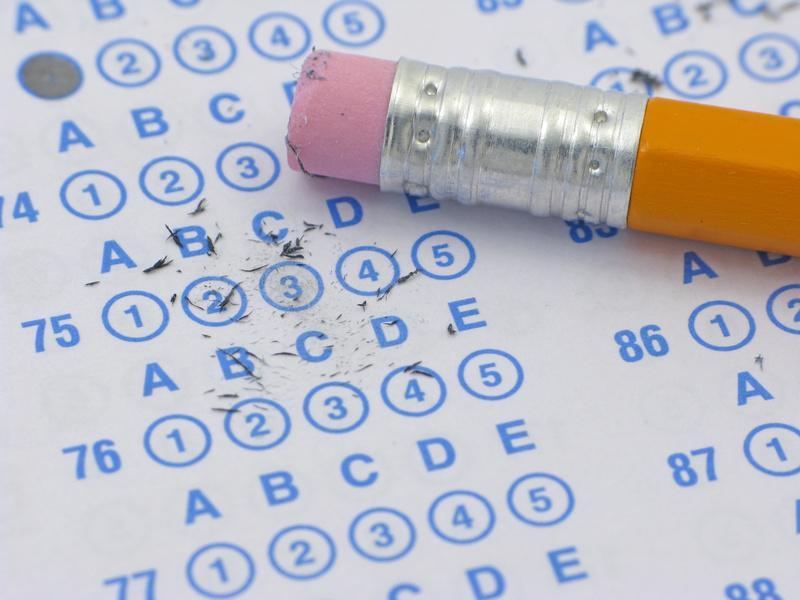Multiple Choice…More Like Multiple Failure
March 2, 2016
Multiple choice: for some it is a dreaded game of luck and for others it is a chance to guess. For those of you who excel at this game of Russian roulette, you must not be taking any English classes. People moan at essays and short answer questions but are they as challenging as people making them out to be? Would you rather have a chance to justify and explain yourself or face the blood red marks declaring your answer a failure? And what are multiple choice tests showing anyway, that we can regurgitate information or that we have luck on our side, that it is easier for a machine to scan bubbled answers than for people to understand people? English is an uncertain subject where one plus one is not always two and where humanity’s kaleidoscope of feelings come with a preponderance of explanations and struggles. So shouldn’t free response questions be king? Shouldn’t students urge graders to understand how limiting multiple choice is? Shouldn’t students call for more emphasis on essays? Shouldn’t students urge graders to understand their ideas, not their ability to guess from a fixed set of multiple chances to fail?
Multiple choice is a pain. And I don’t just mean it is a hassle. It is paining learning. Washington University professor Henry L. Roediger III and Duke University professor Elizabeth J. Marsh studied the effect on multiple choice on learning. Their results were undeniable. They found that when students face one correct answer and three incorrect answers, they are less likely to retain the correct answer. Regardless of whether they choose right, the exposure to wrong answers clouds students’ sense of certainty. They begin to consider that the misinformation is true. They begin to lose sight of what is true, in no way fostering knowledge or helping students. It is a simple and dangerous equation: the more alternatives on a multiple choice test, the more errors on a later recall test of the information. Multiple choice tests are not only detriments to test scores but our learning itself. But go ahead, continue trading education for ease of grading. I’m sure we will all appreciate the effects soon enough.
The limits of multiple choice do not prove the benefits of essays. Essays do that all by their lonesome. They offer students a chance to think outside the box, and I mean a box quite literally. These essays not only allow students to demonstrate their knowledge in a plethora of ways but a chance to develop their writing skills. Unlike multiple choice that, at its core, combats learning, essay writing fosters acceptance of a student’s ideas. It expands the mind rather than deceiving and limiting it. Of course, these essays eat up more of instructors’ grading time but at what cost? Would they trade students’ space to explore, to explain their point of view, to grow their confidence for ease of grading? Would they sacrifice the education system’s…well, “education”?
However, essays do not just offer students the chance to explain themselves and expand their thinking. It is a better measure of whether a student understands a concept. Students of the world, we have all taken a multiple choice test, read a question and known the answer. One problem: it was not one of the choices. Multiple choice proves that a student can pick out an answer, not that they have learned a concept. Essays, according to Ph.D. Mark Christensen, requires test-takers to “supply answers, not just select them.” Essays, therefore, are not only better teachers but better measures of learning than multiple choice.
The results are plastered in my mock AP English test scores, for example. My English teacher tasked the class with taking a retired AP exam to gauge students’ current levels of success and where they need to concentrate their growth. The test featured three essay questions and 53 multiple choice questions. The essay questions are scored on a 0 to 9 scale and I scored one 7 and two 9’s. On the multiple choice, I answered correctly only 41 of the 53 multiple choice questions. My results are not an anomaly either. Many of my peers reported that the essay questions saved them. These essays offered students the chance to explain themselves rather than plucking a narrow answer from a set of choices. It proved that we understood the English language far more than multiple choice questions telling us there is only one way to interpret a story.
There is something wrong with school and for once it is not that the heaters are pumping dry air in the summer or that they have been shut off in the winter. Schools are deceiving and limiting kids with multiple choice questions, ignoring the space essays provide, and ignoring the accuracy of essays to measuring a student’s understanding. They are offering kids, not multiple choices but multiple chances to fail.




